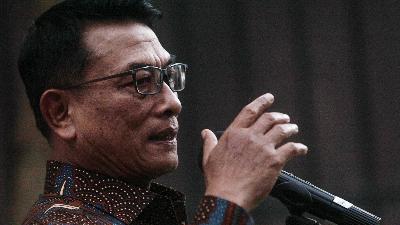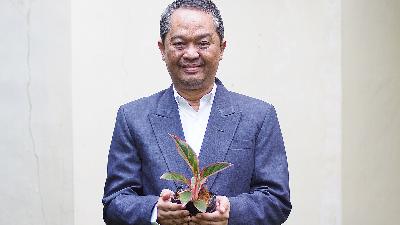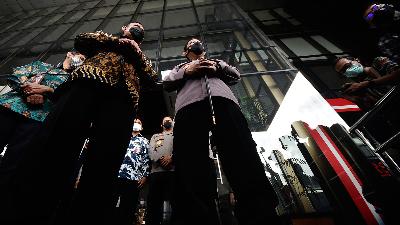The Prodigal Son Denied
Monday, October 11, 2021
Agro Industri Nasional or Agrinas denies being the implementer of the defense ministry’s food estate project. But the company’s proposal submitted to South Korea exposes its roles in the project.
arsip tempo : 174348911750.
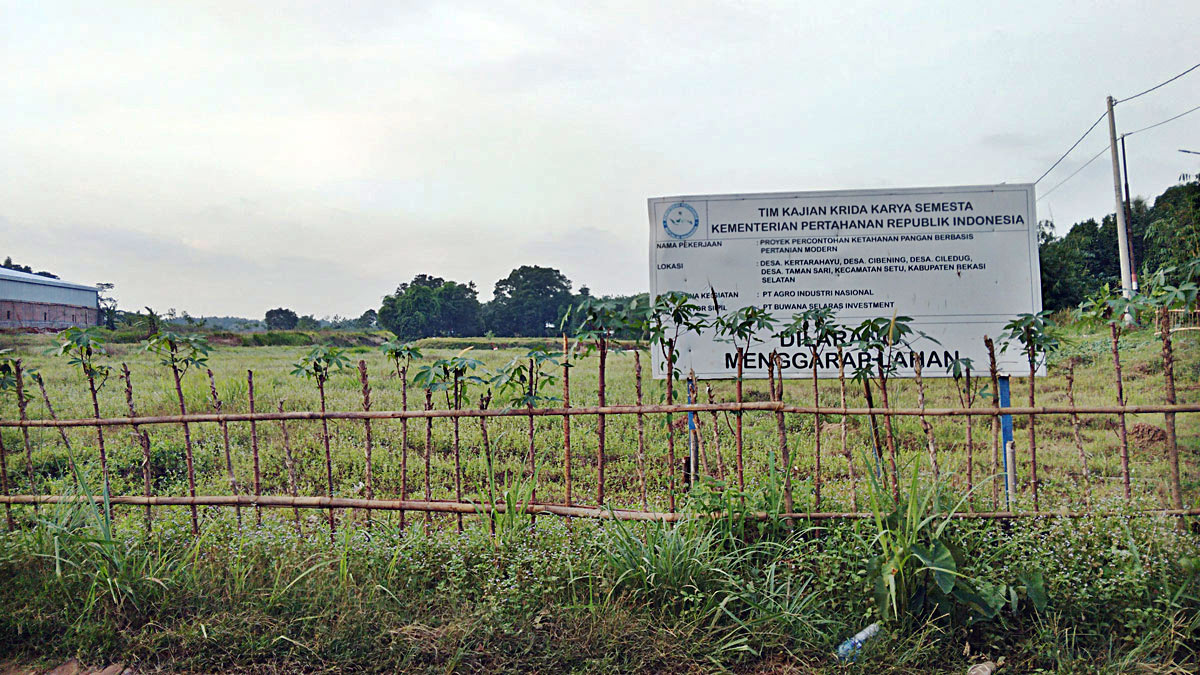
CHILDREN in Kertarahayu village in Bekasi, West Java, can no longer fly their kites on a field next to their village. The previously vacant land has been planted with cassava, chili peppers, corn, paddy, as well as fruit trees. According to a sign placed at the front of the property, Agrinas Capability Center owns the plantation.
Agrinas stands for Agro Industri Nasional. On its website, agrinas.id, the company calls the plantation 50 kilometers east of Jakarta as the Agrinas Center for Research, Development, and Education. But the same sign at the plantation contains the text “Krida Karya Semesta Assessment Team, Republic of Indonesia’s Ministry of Defense.”
There were 25 types of plants on the 60-hectare plantation. Two-meter-tall security posts on stilts were planted around the property. Several people in camouflage pants were seen entering and leaving these security posts. “The land used to belong to Pak Prabowo, the minister,” said Yanti, 42, a Kertarahayu resident, on Tuesday, September 28.
In his 2019 official wealth and assets report (LHKPN), Defense Minister Prabowo Subianto did not report the Kertahayu property. Most of Prabowo’s real estate is located in Bogor, West Java, his home regency. But, during the first rice harvest on the Kertahayu land on February 12, Prabowo came along with Bosowa Group owner, Aksa Mahmud. “This is trial rice using the Presisi (precision) agricultural technology,” Prabowo said during the occasion.
Presisi is the use of microbes and synthetic fertilizer to boost rice productivity. For the Presisi project, Agrinas planted rice on a 5-hectare plot. According to Prabowo, the Presisi technology would be applied for rice planted on a larger land area, which is why the Agrinas plantation in Kertarahayu was expanded to 60 hectares.
Agrinas employees who planted the various plants were members of the university paramilitary group (Menwa). Agrinas only began to involve locals in the planting process in the past four months, paying them Rp80,000-100,000 per day. During break time, these employees would eat or drink at Yanti’s food stall. Yanti heard many stories about the company from those employees and from the military personnel on guard who helped with the planting process.
According to the company employees, Agrinas once experimented with planting sorghum, a cereal plant with a higher carbohydrate content than rice. The plant can also be fed to cattle. But the project was a failure. Now the land is overgrown with weeds.
But what is Agrinas and what is its relationship to the defense ministry? According to its articles of incorporation, dated April 3, 2020, Agrinas’ shareholder is the Defense Resource Potential Development Foundation (YPPSDP).
The foundation’s name came under the spotlight when defense expert Conny Bakrie divulged the defense ministry’s primary weapons system budget of Rp1,760 trillion. The procurement company is Teknologi Militer Indonesia (TMI), whose shares are owned by YPPSDP.
YPPSDP owns a 99 percent share in Agrinas, while the rest belongs to the Employee Cooperative. Its officials are in the elite circle of the Gerindra Party led by Prabowo Subianto. Agrinas’ Chief Executive Officer (CEO) is Rauf Purnama, member of Gerindra’s board of experts. Meanwhile, Dirgayuza Setyawan, former chairman of Gerindra’s social media and public information division, is Agrinas’ operations director and deputy CEO.
Several Agrinas staff members are defense ministry employees, including Mahesa Mukhsin, who is still the company’s chief strategy officer and chief financial officer. Mahesa was a member of the defense minister’s expert staff until February. Two weeks ago, he deleted information about his work at the defense ministry from his social media status. Mahesa has not responded to questions about his positions at Agrinas and the defense ministry.
Furthermore, retired military officers sit on the company’s board of commissioners, including Maj. Gen. (ret) Arri Sujono, personal assistant to the Army chief of staff in 2008. There are also Brig. Gen. (ret) Surya Dharma, chief of the Indonesian Military (TNI) Operations Control Center in 2015, and Lt. Col. (ret) Handoko, who has led TNI administration. These retired military officers were members of Prabowo Subianto’s campaign team during the 2019 presidential election.
Agrinas is currently developing a 33,750-hectare cassava plantation in Gunung Mas forest, Central Kalimantan. Gunung Mas Regent Jaya Samaya Monong said Agrinas representatives came together with the defense ministry when they disseminated the food estate program last year. “They claimed to be partners,” said Jaya.
Agrinas’ cassava project in Gunung Mas is recorded in a proposal submitted to the South Korean government. In the document titled Cassava Estate and Rice Estate Investment, Agrinas claimed that besides Gunung Mas they also had 12 other cassava plantations in eight provinces, each 30,000 hectares in size.
In the proposal containing a photo of Prabowo shaking hands with South Korean Minister of Defense Jeong Keyong-doo, Agrinas asked the South Korean government to invest in the amount of Rp4.17 trillion. The targeted modified cassava flour (mocaf) production with said investment is at 1,000 tons per day per location.
The proposal stated that the development of cassava plantations was a part of the national strategic projects. Through the Presidential Regulation No. 109/2020 on the third revision to Presidential Regulation No. 3/2016 on the acceleration of strategic national projects, the government included food estate as a national strategic project.
Based on a metadata analysis, the proposal was created on January 5, by Dirgayuza Setyawan. He has not responded to questions asking him to clarify the proposal, which showed Agrinas’ ties to the defense ministry, and claimed that the company was working on numerous food estate projects.
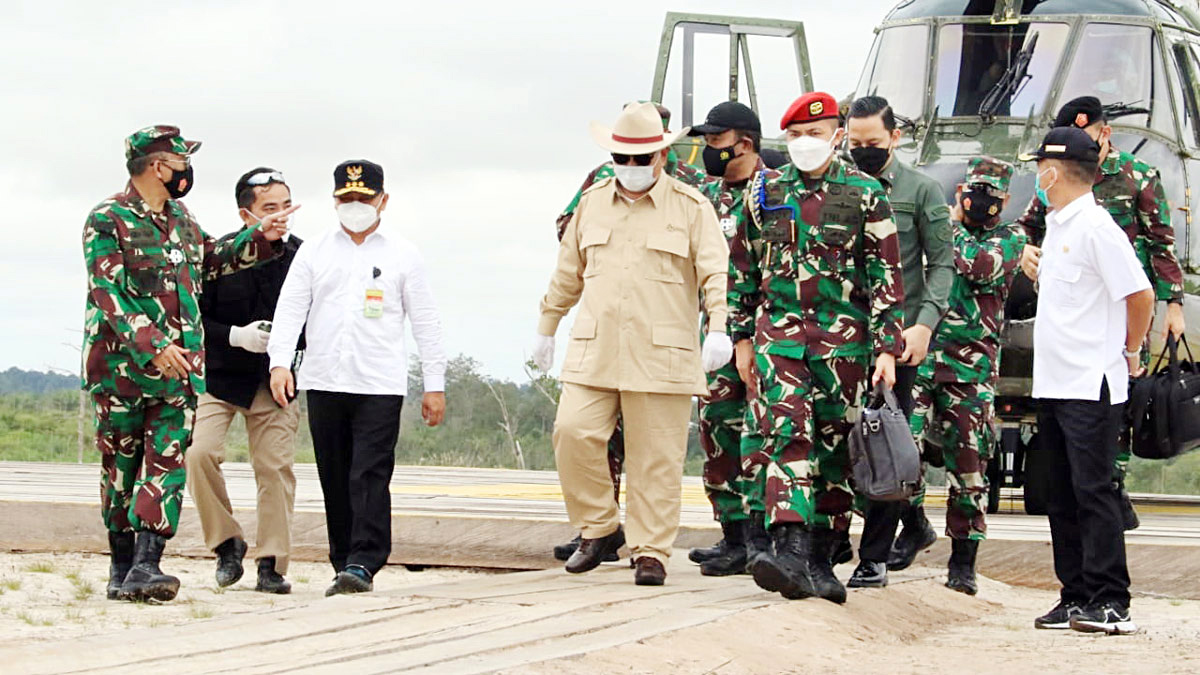
Defense Minister Prabowo Subianto (in brown shirt) visits the food estate project in Tewai Baru village, Gunung Mas Regency, Central Kalimantan, in March. biroadpim.kalteng.go.id
In the proposal submitted to the South Korean government, Dirgayuza explained that the cassava estate project was directly monitored by President Joko Widodo. Furthermore, Agrinas was mentioned as a company under the Indonesian defense ministry, which reported directly to Defense Minister Prabowo Subianto.
Oddly, Agrinas Vice President Corporate Secretary Agrinas Novalia Hartono denied that her company runs the defense ministry’s food estate project. She also refuted that Agrinas went in a hunt for investors, including in South Korea. “Agrinas has never been involved in this,” said Novalia. “In the corporate world, Agrinas as a private company of course actively looks for investments and forms partnerships with various entities.”
Likewise, Defense Ministry Chief of Public Information First Marshal Penny Radjendra denied that the defense ministry’s food estate project has ties to Agrinas. “We have not appointed a private partner for the strategic logistics reserves,” said Penny on Thursday, September 30. In the opening statement of his letter, Penny said his answer was not delivered on behalf of Prabowo, but rather on behalf of Defense Ministry Inspector-General Lt. Gen. Ida Bagus Purwalaksana.




